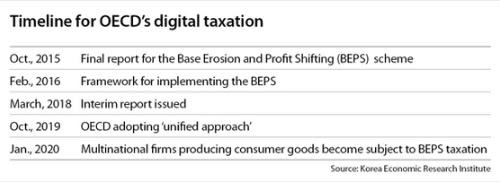└[고급]영자신문읽기 신문 속 다양한 세상 이야기를 이제 영어로 만나보세요!
Google Tax mission creep could threaten Korea Inc.
2020-05-30

With the "Google tax" threatening to creep from its original target of IT companies to cover manufactured goods and threaten some of Korea's most valuable brands, the country needs to fight back, a research institute run by a major business lobby has advised.
A report published by the Korea Economic Research Institute called for the need to scrap the Organisation for Economic Cooperation Development (OECD)’s proposal to broaden the scope of the digital tax to include consumer goods makers as well as IT service companies like Google and Amazon.
The international organization is working to draw up the new taxation system for multinational companies by the end of the year, which is designed to address the tax challenges raised by digitalization. Multiple countries, especially those in Europe, opted to impose more taxes on multinational tech companies since they often shift their profits to low-tax locations.
In the latest OECD report published in January, the proposed targets of taxation were widened to include large consumer goods makers.
Defined as "consumer-facing businesses" in the report, the newly-added targets are manufacturers of personal computing products, branded foods and refreshments and automobiles with the gross revenue threshold tentatively set at 750 million euros ($822.7 million).
If the proposal is implemented, Samsung Electronics and Hyundai Motor could be subject to the tax.
The report, authored by researcher Lim Dong-won, claimed that the change could place an unfair burden to Korean companies and go against the initial purpose of preventing tax evasion by IT service providers.
“The government needs to make its voice heard in order to correct the proposal covering manufacturing companies, which is in line with the national interests,” the report said.
Lim went on to note that Korea should form an institutional framework with other Asian nations to express disapproval.
“As an export-reliant country with multiple consumer-facing businesses, we need to set up an institutional network with Asian countries to exclude consumer goods makers from the list for taxation,” it said.
The hardest-hit nations could be Japan, Vietnam, India, China and Korea.
The discussion is based on the final report of Base Erosion and Profit Shifting (BEPS), a tax planning strategy aimed at preventing profit-shifting, published in 2015.
Last December, it made an announcement to pursue a "unified approach" to cover consumer-facing businesses on top of IT service companies, which became the base for the January proposal.
Both Hyundai Motor and Samsung Electronics declined to express their stance on the OECD’s push for digital tax, adding that the decision has yet to be finalized.

| 번호 | 기사목록 | 날짜 | 조회수 |
|---|---|---|---|
| 60 |
 |
2024-04-19 | 768 |
| 59 |
 |
2024-04-18 | 4351 |
| 58 |
 |
2024-04-17 | 4293 |
| 57 |
 |
2024-04-16 | 4200 |
| 56 |
 |
2024-04-15 | 4013 |
| 55 |
 |
2024-04-14 | 3823 |
| 54 |
 |
2024-04-13 | 3604 |
| 53 |
 |
2024-04-12 | 3935 |





























